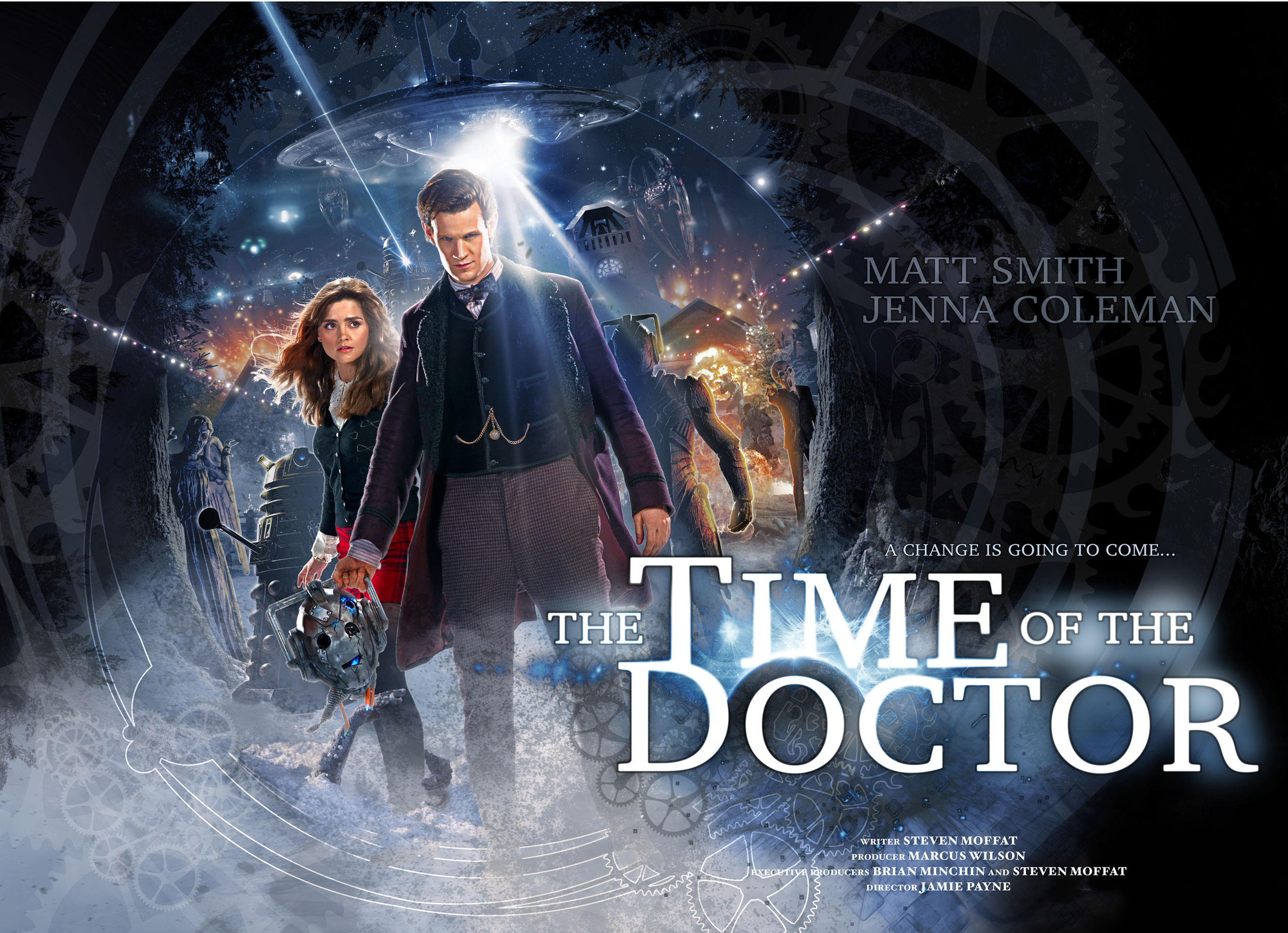
Aired 25 December 2013
The end of the Doctor Who’s fiftieth anniversary years brings with it the end of Matt Smith’s tenure as the Eleventh Doctor, offering an ambitious episode with plenty of action and answers and providing perhaps Smith’s greatest performance in the role as he hands the reigns over to Peter Capaldi.
The episode starts off at a breakneck pace- instantly quelling any fear that this would be a lighter and more straightforward episode due to its holiday airing- and before the credits have even rolled the Doctor has battled both the Daleks and Cybermen, introduced the mysterious message that needs investigating, and been invited to Clara’s family’s Christmas dinner. Aside from a few lulling and repetitious minutes in the middle, the entire story offers a lot of meaningful content, and it’s a shame that at least a few more minutes couldn’t be added to its airtime in order to more fully flesh out some of the concepts in play.
Whether a BBC mandate or not, ‘The Time of the Doctor’ does try to fit in some Christmastime aspects in addition to everything it is trying accomplish, but it is these sections- probably inevitably- that seem the weakest. The majority of the tale takes place in a town called Christmas, not a problem but also not a name of necessity, but it’s hard to argue that the scenes with Clara’s family do anything to heighten the story other than to show the obvious contrasts in her life. The scenes themselves are well written and played with believable emotion, but they just seem to detract from the Doctor’s finale in order to remind viewers that it’s Christmas.
The storyline proper, though, is much more satisfying and effective. Handles the Cyberman interprets the enigmatic message and proclaims its origin, bringing the prospect of Gallifrey returning back into the show. The Doctor soon travels to an unknown planet but, like so many other villainous aliens, finds himself unable to reach the surface; fortunately Tasha Lem, the Mother Superior of the Papal Mainframe, is able to help Clara and the Doctor overcome this obstacle. The planet, regrettably for the Doctor, is the on which he knows he will meet his death, Trenzalore, but it is in the village of Christmas that answers regarding the Eleventh Doctor’s era being coming at a staggering pace. River Song, the Silence’s motivations, the TARDIS blowing up, and even the cracks that have been a recurring sight since ‘The Eleventh Hour’ all receive further information, albeit each with varying levels of success.
Perhaps fittingly, the cracks ended up being vital to the progression of the story, although it’s difficult to know if the explanation offered here was planned from the beginning or added on later. Somewhere behind those cracks are the Time Lords, attempting to return to this universe when they get the answer to ‘Doctor Who?’. In a beautifully scripted move, the Doctor soon faces a challenge bigger than any he’s faced before. The Time Lords need the Doctor to say his name to return, but their returning will result in all-out war and utter destruction; the Doctor needs their help in order to not die, but everyone will die if he helps them. Resigned to living with his conscience unbroken, the Doctor takes the mantle of protector of Christmas, spending centuries defeating the occasional foe that manages to break through the planetary barrier in order to maintain some semblance of peace.
It’s in this section that the energy of the show decreases a bit as, aside from short vignettes of battles, a lot of time is spent showing the Doctor reflecting on his situation via drawings of other battles, continuing to age as he does so. Even though they are effective in showing the length and despair of the Doctor’s mettle, they’re just a little too repetitive. The aging makeup, camerawork, and visuals remain top notch throughout, however.
An even bigger issue for the show to resolve, however, is the Time Lord regeneration limit as Smith points out that the secret of the War Doctor as well as Tennant’s halted regeneration in ‘Journey’s End’ both count, effectively making him the thirteenth and final incarnation. There is probably no way to satisfactorily give the character a new lease on life, but the precedent of being given a new regeneration cycle had been set in the twentieth anniversary special ‘The Five Doctors,’ and so a furtive and passionate request from Clara to the Time Lords achieves that aim. It’s a succinct and measured move that’s adequate enough to keep the plot moving and to assure the continuance of the programme.
What cannot be overstated enough is how fantastic the performances of the two leads are from beginning to end. ‘The Time of the Doctor’ demands more of Matt Smith than any previous episode, and he fully delivers with a sobering mixture of comedy and burdened resoluteness and bravery. Just as impressively, Jenna Coleman shows that Clara still has life in her character now that the main mystery of her has now been explained. She is seemingly becoming more intelligent and willing to take the initiative and time progresses, and it will be fascinating to see if and how that progression continues going forward.
‘The Time of the Doctor’ unarguably successfully brings to a close Doctor Who’s golden anniversary, anchored by two very strong performances from its leads. It may not be the perfect farewell to Smith as the episode has so much to rush through, but he is perfect throughout. A split-second regeneration after a short- and thankfully unaged- scene of closure with an emotional cameo later, and Peter Capaldi is left to steer the TARDIS into future adventures.


October 12, 2021
[…] Ramblings; The M0vie Blog; Tapetrade; Junkyard Blog; Lyratek; Random Whoness; Doctor Who Reviews; Who In […]